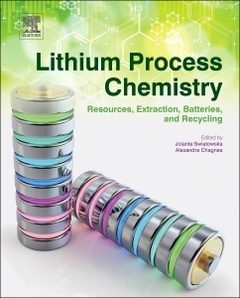Lithium Process Chemistry Resources, Extraction, Batteries, and Recycling
Coordonnateurs : Chagnes Alexandre, Swiatowska Jolanta

Lithium Process Chemistry: Resources, Extraction, Batteries and Recycling presents, for the first time, the most recent developments and state-of-the-art of lithium production, lithium-ion batteries, and their recycling.
The book provides fundamental and theoretical knowledge on hydrometallurgy and electrochemistry in lithium-ion batteries, including terminology related to these two fields. It is of particular interest to electrochemists who usually have no knowledge in hydrometallurgy and hydrometallurgists not familiar with electrochemistry applied to Li-ion batteries.
It is also useful for both teachers and students, presenting an overview on Li production, Li-ion battery technologies, and lithium battery recycling processes that is accompanied by numerous graphical presentations of different battery systems and their electrochemical performances. The book represents the first time that hydrometallurgy and electrochemistry on lithium-ion batteries are assembled in one unique source.
1. Global Lithium Resources and Sustainability Issues
Patrice Christmann, Eric Gloaguen, Jean-François Labb_e, J_er_emie Melleton, Patrice Piantone
2. Fundamentals in Electrochemistry and Hydrometallurgy
Alexandre Chagnes
1. Fundamentals in Lithium-Ion Batteries
2. Fundamentals in Hydrometallurgy
3. Lithium Production Processes
Tam Tran, Van T. Luong
1. Introduction
2. Lithium Production Processes
3. New Project Development
4. Conclusions
4. Lithium Battery Technologies: From the Electrodes to the Batteries
Jolanta _Swiatowska, Philippe Barboux
1. Introduction
2. Battery Components and Electrode Limitations
3. Positive Electrode (Cathode) Materials
4. Negative Electrode (Anode) Materials
5. Separator and Current Collectors
6. Interface Chemistry in LiBs
5. Lithium Battery Technologies: Electrolytes
Alexandre Chagnes
1. Introduction
2. Liquid Electrolytes
3. Polymer Electrolytes
4. Anodic Stability of Liquid Electrolytes
5. Electrolyte Wettability
6. Conclusion
6. Perspectives in Lithium Batteries
Philippe Poizot, Franck Dolhem, Joël Gaubicher, St_even Renault
1. Introduction
2. Potential of Li-sulfur Batteries
3. Li-oxygen System for Ultrahigh-energy Density Batteries
4. Li-aqueous Batteries
5. Greener Opportunities Offered by Organic Batteries
7. Lithium Batteries Recycling
Christian Ekberg, Martina Petranikova
1. Introduction
2. Characterization of Spent LIBs Waste
3. Recycling of Spent Portable LiBs
4. Industrial Technologies for Spent LIBs Recycling
5. Conclusion
8. Life Cycle and Sustainability
Daniel Belchí Lorente, Guillaume Mandil, Lenka Svecova, Pierre-Xavier Thivel,
Peggy Zwolinski
1. Introduction
2. LCA Applied to LIBs "Concept, Method, and Key Results"
3. From Recycling Process Definition to Sustainable Industrial Solutions
Chemical engineers, metallurgists, academic researchers in these areas
Scientific library in universities and research institutes
Professor Alexandre Chagnes published 141 papers including 122 papers in peer-reviewed journals, 6 books including two books as Editor for Elsevier, 10 book chapters and 2 patents in the fields of electrochemistry and chemistry applied to lithium-ion batteries and hydrometallurgy. His research aims to develop the basic knowledge to remove technological barriers for the recovery of metals from primary and secondary resources. He created the French network of Hydrometallurgy PROMETHEE I 2014, which gathers 31 french laboratories. Professor Chagnes is currently the Director of the Industrial Partnerships at ENSG (Engineering School of Geology of Nancy) and Scientific Director of the LabEx RESSOURCES21 – a cluster of 9 laboratories focusing on the geochemical cycle of metals, raw material characterization, environmental and societal impact of mining, extractive metallurgy, and resource economics.
Dr Jolanta Swiatowska received her PhD (electrochemistry) in 2003 from the AGH University of Science and Technology in Cracow (Poland). She has joined the Chimie ParisTech (ENSCP) in 2005 first as a postdoctoral researcher and then in 2008 as a CNRS research associate. She has developed her scientific competences combining electrochemistry with surface science analytical techniques (XPS, ToF-SIMS) for application in different domains like energy storage, corrosion, material science. Since 2005 she has been participating in the numerous scientific projects in collaboration with industrial and academic partners on Li-ions batteries focused on understanding the reaction mechanisms related reactivity of electrode materials related to the process of lithium insertion/deinsertion, the formation of passive layer (Solid Electrolyte Interphase layer) and the mechanisms of electrode ageing. She has 40 publications in national and international journals, 65 conference presentations, and 13 seminars.
- Provides fundamental and theoretical knowledge on hydrometallurgy and electrochemistry in lithium-ion batteries
- Represents the first time that hydrometallurgy and electrochemistry on lithium-ion batteries are assembled in one unique source.
- Ideal for both electrochemists who usually have no knowledge in hydrometallurgy and hydrometallurgists not familiar with electrochemistry applied to Li-ion batteries
- Presents recent developments, as well as challenges in lithium production and lithium-ion battery technologies and their recycling
- Covers examples of Li processes production with schematics, also including numerous graphical presentations of different battery systems and their electrochemical performances
Date de parution : 06-2015
Ouvrage de 312 p.
19x23.3 cm
Thèmes de Lithium Process Chemistry :
Mots-clés :
Aqueous rechargeable batteries; Bioavailability; Biomarkers; Brines; Charge-discharge; Circular economy; Criticality; Current collector; Demand; Economics; Ecosystem; Electrochemical properties; Electrolytes; Environmental impact; High-technology metals; Li-air batteries; Life cycle analysis; Life cycle impact assessment; Life cycle impact indicator; Lithium; Lithium batteries; Lithium production; Lithium-sulfur batteries; Lithium-ion batteries; Media; Metabolism; Mineral sources; Negative electrode (anode); Organic batteries; Passive layer; Physicochemical properties; Positive electrode (cathode); Processes; Rare metals; Recycling; Sampling; Separator; Solid electrolyte interphase layer; Supply; Sustainability; Sustainable development



